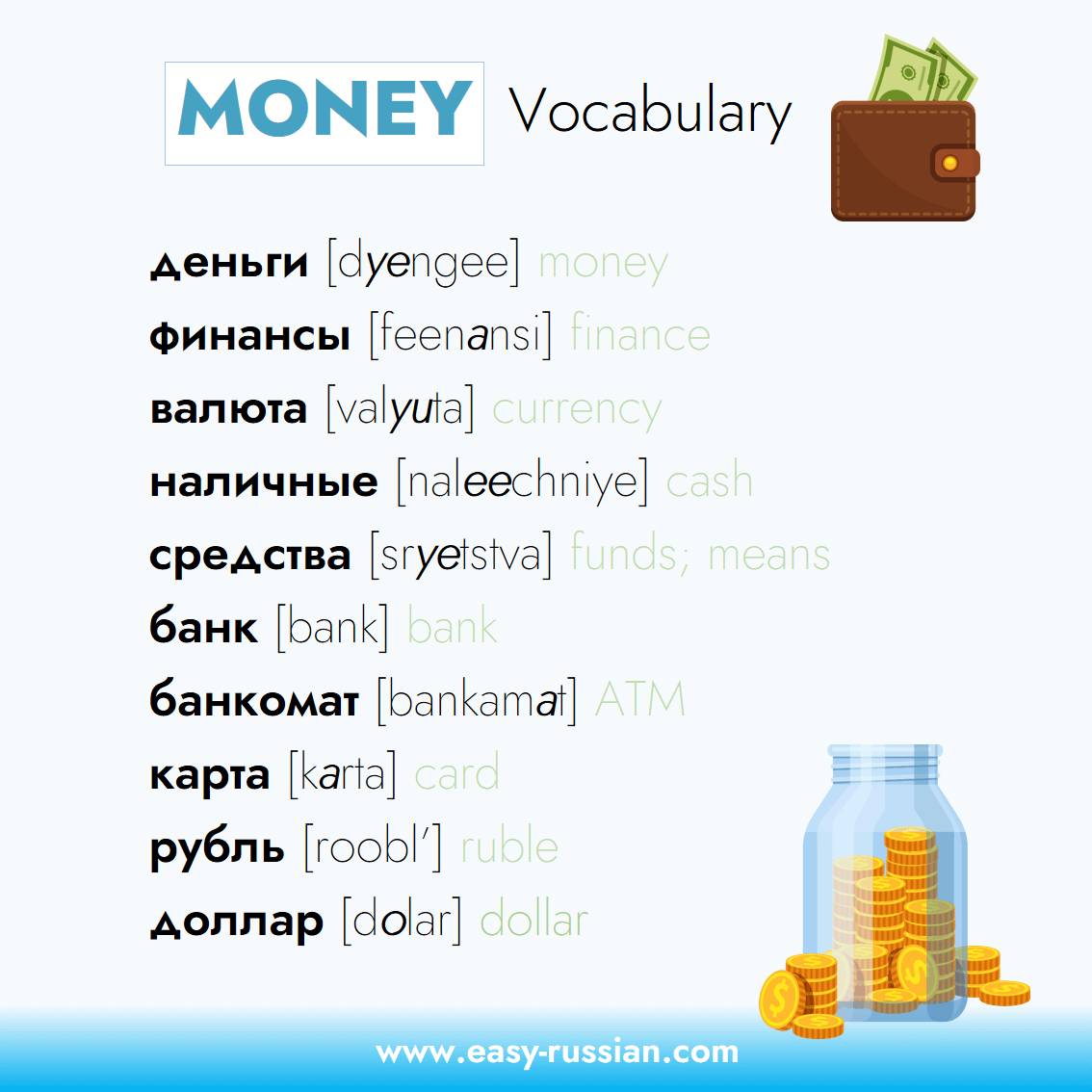Mastering Money Talk: A Beginner’s Guide to Russian Finance Terminology
If you’re planning to visit Russia or do business with Russian speakers, it’s essential to have a good understanding of money-related vocabulary. In this article, I’ll cover a range of words and expressions related to money in Russian: from basic terms like ruble and kopeck to more complex concepts like inflation and exchange rates.
Russian Currency
The Russian ruble (RUB) is the official currency of Russia, and it is denoted by the symbol “₽”. The ruble is divided into 100 kopeks, which are represented by the symbol “к”. Banknotes come in denominations of 10, 50, 100, 200, 500, 1000, 2000, and 5000 rubles, while coins come in denominations of 1, 2, 5, and 10 rubles, as well as 1, 5, 10, and 50 kopeks.

Kopeks are rarely used, to be honest, because they’re actually worth nothing these days.
- рубль – ruble
- два рубля – two rubles
- 5 рублей – 5 rubles
- 30 рублей – 30 rubles
- копейка – kopek
- две копейки – two kopeks
- 50 копеек – 50 kopeks
The ruble has had a tumultuous history, with periods of hyperinflation and currency devaluation. In recent years, the ruble has stabilized somewhat, but it remains subject to fluctuations in the global economy and geopolitical events.
It’s worth noting that in addition to the official ruble, there are also various unofficial currencies used in Russia, such as the US dollar and the euro. Many businesses in Russia will accept payment in these currencies, particularly in tourist areas, but the exchange rate may not always be favorable.
- доллар – dollar
- два доллара – two dollars
- 100 долларов – hundred dollars
- евро – euro
- два евро – two euros
- 20 евро – 20 euros
Money Vocabulary Word List
Let’s start with the basic words we need to know when dealing with money.
деньги – money (always plural)
финансы – finance
валюта – currency
обмен валют – currency exchange
монета – coin
банкнота / купюра – bill, banknote
наличные – cash
трата – spending, expenditure (plural: траты)
доход – income, revenue (plural: доходы)
расход – expenditure, expense (plural: расходы)
сумма – amount (of money)
стоимость – cost, worth
средства – funds; means
сбережения – savings
кошелёк – wallet, purse
бюджет – budget
инвестиция – investment
экономия – saving
экономика – economy, economics
банкрот – bankrupt

Important Verbs
Understanding money-related verbs in Russian is essential for effective communication about financial matters. These verbs allow us to express actions and transactions related to money in a clear and concise manner. With the right verbs, we can discuss payments, describe transactions, talk about saving and investing, and address issues of fraud and security.
There are several verbs that are commonly used when talking about money in Russian:
- тратить [trateet’] – to spend
- платить [plateet’] – to pay
- зарабатывать [zarabativat’] – to earn
- вкладывать [fkladivat’] / инвестировать [eenveesteeravat’] – to invest
- копить [kapeet’] / откладывать [atkladivat’] – to save, to save up
- экономить [ekanomeet’] – to economize, use sparingly
- обменивать [abmyeneevat’] – to exchange
For example, you can say:
Я трачу много денег на еду и одежду. – I spend a lot of money on food and clothes.
Он тратит 10 тысяч в месяц на обучение. – He spends 10,000 a month on learning courses.
Я плачу за квартиру каждый месяц. – I pay for the apartment every month.
Я зарабатываю 30 тысяч рублей в месяц. – I earn 30,000 rubles a month.
See Also: Russian Vocabulary for Working
Кто-то вложил в этот проект очень большие деньги. – Someone invested quite a lot of money in this project.
Мы вкладываем деньги в акции. – We invest money in stocks.
Он решил вложить свои сбережения в недвижимость. – He decided to invest his savings in real estate.
Я коплю на новую машину. – I’m saving up for a new car.
Мы стараемся экономить каждый рубль. – We try to save every ruble.
Я хочу обменять доллары на рубли. – I want to exchange dollars for rubles.
When talking about lending or borrowing money, the following verbs are commonly used:
- одалживать [adalzhivat’] – to lend (perfective: одолжить [adalzhit’])
- брать (деньги) в долг [brat’ v dolg] – to take (money) in debt, to borrow
- занимать [zaneemyat’] – to borrow (perfective: занять [zanyat’])
Verbs in context:
Я одолжил своему брату 1000 рублей. – I lent my brother 1000 rubles.
Он одолжил мне 10 тысяч. – He lent me 10,000.
Одолжи мне 100 рублей, пожалуйста. – Lend me 100 rubles, please.
Я занял у него 10 тысяч. – I borrowed 10,000 from him.
Она заняла у меня 5000 рублей на две недели. – She borrowed 5000 rubles from me for two weeks.
Она взяла у меня в долг 20 тысяч. – She borrowed 20,000 from me.

Paying for things
To talk about paying for something in Russian, you can use the verb платить [plateet’] which means “to pay”. There are many other words with the same stem, and all of them are related to the concept of paying for things or receiving payment.
Платёж means “payment”, but it is more often used in the context of a specific payment, such as a bill or invoice.
Сумма платежа составляет 1000 рублей. – The payment amount is 1000 rubles.
После подтверждения транзакции ваш платёж будет обработан мгновенно. – After the transaction is verified by your bank, your payment will be processed instantly.
В результате общая сумма переплаты за ипотеку увеличивается, зато уменьшается ежемесячный платёж. – As a result, the total amount of overpayment for a mortgage increases, but the monthly payment decreases.
платёжная система – payment system
оплачивать – pay for
Она должна оплачивать лекарства из собственного кармана. (= Она должна платить за лекарства из собственного кармана) – She has to pay for her medicine out of her own pocket.
Вы должны оплатить доставку. – You must pay for delivery.
оплата – payment (often used with an indication of what the money is being paid for)
Оплата производится наличными или картой. – Payment can be made in cash or by card.
уплата – payment (what is being paid)
- оплата услуг – payment for services
- оплата проезда – payment for travel
- оплата коммунальных услуг – payment of utilities
- оплата налогов – paying taxes
- уплата штрафов – payment of fines
- уплата пошлины – payment of the fee
выплата – payout, compensation
Это единовременная выплата на год вперёд. – This is a one-time payment for one year.
Страховая выплата осуществляется на основании письменного заявления получателя выплаты и подтверждающих документов. – Insurance compensation is effected on the basis of a written statement made by the beneficiary of the payment and the supporting documents.
Th verbs платить, заплатить and оплатить are all verbs related to the act of paying. To avoid confusion, let’s look at how these verbs differ.
Платить is used to describe regular or ongoing payment actions. The emphasis is on the process of paying rather than the completion of payment.
Он платит арендную плату каждый месяц. – He pays the rent every month
Ты будешь платить за билеты в кино? – Will you pay for the movie tickets?
Заплатить is a perfective verb derived from the verb платить. It emphasizes the completion of the payment action. It is used when referring to making a one-time or specific payment.
Она заплатила за услуги парикмахера наличными. – She paid for the hairdresser’s services in cash.
Ты должен заплатить за участие в мероприятии. – You need to pay for participation in the event.
Оплатить is also a perfective verb derived from the verb платить. It specifically refers to paying for a service, bill, or an order.
Мы оплатили счёт в ресторане. – We paid the bill at the restaurant.
Я должен оплатить счета за электричество и воду. – I have to pay the bills for electricity and water.
Она будет оплачивать услуги своего адвоката ежемесячно. – She will be paying for the services of her lawyer monthly.
Мы оплатили заказ в интернет-магазине. – We paid for the order in the online store.
Он оплатил проживание в отеле заранее. – He paid for the accommodation in the hotel in advance.
See Also: Words and Phrases for Shopping in Russian
Banking Products and Services
The world of banking is an integral part of our daily lives, involving a wide range of products and services that help manage our finances. Understanding the vocabulary associated with banking in Russian is essential for effective communication and financial literacy. In this section, we will explore the key terms and phrases related to banking products and services in the Russian language.

банк – bank
банкомат – ATM
счёт – account
банковский счёт – bank account
открыть счёт в банке – to open a bank account
вносить деньги на счёт – to deposit money into the account
Благодаря PayPal, вы можете внести деньги на счёт в считанные минуты. – Thanks to PayPal, you can deposit money in a matter of minutes.
снимать наличные – to withdraw cash
расчёт – settlement; payment
баланс – balance
комиссия – commission, fee
карта – card
банковская карта – bank card
дебетовая карта – debit card
кредитная карта – credit card
оформить кредитную карту – to get a credit card
снимать наличные – to withdraw cash
ссуда / заём – loan
кредит – loan, credit
Я хочу взять кредит на ремонт. – I want to take out a loan for home improvement.
выдать кредит – to give a loan/credit
получить кредит – to get a loan/credit
проценты по кредиту – loan interest
кредитная история – credit history
платить по кредиту – to pay the loan
погасить кредит – погасить кредит
Эксперты утверждают, что гораздо выгоднее как можно скорее погасить кредит. – Experts claim that it is much more profitable to repay the loan as soon as possible.
Он погасил кредит вчера. – He repaid the loan yesterday.
задолженность – debt
депозит / вклад – deposit
банковский вклад – bank deposit
интернет-банкинг – internet banking
мобильное приложение – mobile application
двухфакторная аутентификация – two-factor authentication
ограничение по снятию наличных – cash withdrawal limit
блокировка карты – card blocking
Here are a few short dialogues that take place in a bank, along with their parallel English translations. Please note that these dialogues are kept intentionally simple for illustrative purposes. Remember that actual conversations in a bank may vary depending on the specific circumstances and individual preferences.
Dialogue 1:
Customer: Здравствуйте, я хотел бы открыть счёт. (Hello, I would like to open an account.)
Bank Employee: Какой счёт вам нужен? (What type of account do you need?)
Customer: Хотелось бы сберегательный счёт, пожалуйста. (I would like a savings account, please.)
Bank Employee: Хорошо. Вам необходимо заполнить эту анкету. (Alright. You need to fill out this form.)
Customer: Хорошо. (Okay.)
Dialogue 2:
Customer: Здравствуйте, я хотел бы обменять доллары на рубли. (Hello, I would like to exchange dollars for rubles.)
Bank Employee: Конечно. Какую сумму вы хотите поменять? (Certainly. What amount would you like to exchange?)
Customer: 100 долларов. (100 dollars.)
Dialogue 3:
Customer: Добрый день, у меня проблема с банковской картой. (Good day, I have a problem with my bank card.)
Bank Employee: В чём именно проблема? (What exactly is happening?)
Customer: Карта не работает, я не могу снять деньги. (The card is not working, I cannot withdraw money.)
Bank Employee: Нужно проверить ваш счёт. (Let me check your account.)
Customer: Хорошо, я подожду. (Okay, I will wait.)
There you have it! By mastering this vocabulary, you can feel more confident and comfortable discussing money matters in Russian.
Have you found this article helpful? Share your thoughts and experiences, and let’s continue the conversation together in the comments below!
